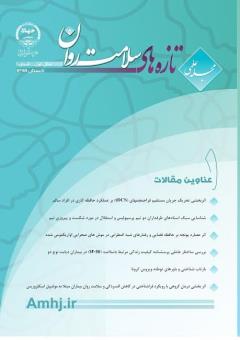اثر عصاره یونجه بر حافظه فضایی و رفتارهای شبه اضطرابی در موش های صحرایی اواریکتومی شده
محورهای موضوعی :هادی سمیزه 1 * , سید رضا فاطمی طباطبایی 2 , نعیم عرفانی مجد 3 , علی شهریاری 4
1 -
2 -
3 -
4 -
کلید واژه: حافظه فضایی, اضطراب, فیتواستروژن, اواریکتومی, یونجه,
چکیده مقاله :
مقدمه: با توجه به غنی بودن یونجه از فیتواستروژن ها و تاثیر فیتواستروژن ها بر سیستم عصبی مرکزی، مطالعه حاضر تاثیر عصاره اتیل استاتی یونجه بر حافظه فضایی و رفتارهای شبه اضطرابی ناشی از برداشت تخمدان را مورد بررسی قرار داده است. روش: 45 سر موش صحرایی ماده 3 ماهه نژاد ویستار، دو هفته پس از اواریکتومی به طور تصافی به گروه های sham(شاهد)، اواریکتومی (ovx)، sham+4 (شاهد g/kg4 عصاره در جیره)، ovx+2 اواریکتومیg/kg2 عصاره در جیره) و ovx+4 اواریکتومیg/kg4 عصاره در جیره) تقسیم شدند. پس از 75 روز تیمار برای ارزیابی حافظه از ماز آبی موریس و برای اضطراب از آزمون ماز بعلاوه مرتفع استفاده شد. همچنین غلظت استروژن سرم، مالون دی آلدیید و آنزیم های آنتی اکسیدان نیز در هیپوکمپ اندازهگیری شدند. یافتهها: اواریکتومی غلظت استروژن سرم و سوپراکسید دیسموتاز هیپوکمپ را کاهش داد و استفاده از عصاره یونجه فعالیت سوپراکسید دیسموتاز را افزایش ولی فعالیت کاتالاز را کاهش داد. عملکرد موشهای گروه ovx+2 در مرحله آموزش در آزمون ماز آبی موریس کاهش یافت، درحالیکه درصد زمان سپریشده در بازوی باز ماز بعلاوه مرتفع در پی استفاده از عصاره یونجه درگروه ovx بیشتر بود. نتیجهگیری: به نظر می رسد هرچند عصاره یونجه اضطراب را در موش های اواریکتومی شده کاهش می دهد ولی ممکن است باعث کاهش یادگیری فضایی آنها شود.
Introduction: According to the high phytoestrogens content of alfalfa and the effect of phytoestrogens on CNS, the effect of ethyl acetate extract of alfalfa on spatial memory and anxiety like behaviors of ovariectomized rats were accessed. Methods: Forty-five female Wistar rats (three-month old) were accidentally divided into 5 groups, including sham, ovariectomy (ovx), sham+4 (4g/kg extract in diet), ovx+2 (2g/kg extract in diet) and ovx+4 (4g/kg extract in diet) two weeks after ovariectomy or sham operation. Memory and anxiety like behavior were elevate using Morris water maze and plus maze, respectively. MDA and antioxidant enzymes were also measured in hippocampus. Results: concentration of estrogen in plasma and superoxide dismutase activity (SOD) in hippocampus were reduced in ovx group, but consumption of alfalfa extract increased SOD activity while decreased catalase activity. Performance of ovx+2 group was decreased in training trial of Morris water maze, while consumption of alfalfa extract in ovariectomized rat increased percentage of open arm time (OAT%) in elevated plus maze. Conclusion: The findings revealed that the five-factor model of the Mc health-related quality of life questionnaire (SF-36) has satisfactory validity and reliability. Thus, this questionnaire can be used in future studies to assess the quality of life of patient’s type 2 diabetes.
1. Moutsatsou P, the spectrum of phytoestrogens in nature: our knowledge is expanding. Hormones Athens. 2007;93-173.
2. Thompson LU, Boucher BA, Liu Z, Cotterchio M, Kreiger N, Phytoestrogen content of foods consumed in anada, including isoflavones, lignans, and coumestan. Nutrition and Cancer. 54. 2017; 184-201.
3. Anderson LN, Cotterchio M, Boucher BA, Kreiger N, Phytoestrogen intake from foods, during adolescence and adulthood, and risk of breast cancer by estrogen and progesterone receptor tumor subgroup among Ontario women. International Journal of Cancer. 2013; (132), 92-1683.
4. Sumien N, Chaudhari K, Sidhu A, Forster, Does phytoestrogen supplementation affect cognition differentially in males and females? Brain Research. 2013; (1514),123-127.
5. Hajirahimkhan, Dietz,Bolton,J.L. Botanical modulation of meno- pausal symptoms:mechanisms of action?. Planta Medica. 2013; (79),538–553.
6. Bourque, M., Dluzen, DE., Di Paolo, T, Signaling pathways mediating the neuroprotective effects of sex steroids and SERMs in Parkinson's disease. Front. Neuroendocrinology. 2017; (33), 169-178.
7. Shanmugan S, Epperson CN. Estrogen and the prefrontal cortex: Towards a new understanding of estrogen’s effects on executive functions in the menopause transition. Human Brain Mapping.2012.
8. A.M. Barron, C.J. Pike, Sex hormones, aging, and Alzheimer’s disease, Frontier in Bioscience, 2012; (4),976-997.
9. AssinderS; Davis R; Fenwic M And Glover A, Adult-only exposure of male rats to a dite of high phytoestrogen content increases apoptosis of meiotic and postmeiotic germ, cells.reproduction 2007; (133),11-19.
10. Omrani, A.; Ghadani, MR.; Fathi, N.; Tahmasian, M.; Fathollahi, Y. and Touhidi, Naloxone improves impalrment of spatial performance induced dy pentylenetetrazol kindling in Rats, Neuroscience. 2007;824-831.
11. Kadifkova, PT., Kulevanova, S, and Stefova, M. in vitro antioxidant activity of some T. pulim species. Acta Pharmaceutica. 2005.
12. Diaz-Veliz.G, T. Alarcon, C. Espinoza, N. Dussaubat, S. Mora, Ketanserin and anxiety levels: Influence of gender, estrous cycle, ovariectomy and ovarian hormones in female rats, Pharmacology Biochemistry and Behavior. 1997; (58), 637-642.
13. OECD guideline for testing of chemicals (2001)
14. Frye.C.A, S.M. Petralia, M.E. Rhodes, Estrous cycle and sex differences in performance on anxiety tasks coincide with increases in hippocampal progesterone and 3a, 5a-THP, Pharmacology Biochemistry and Behavior. 2000; (67),1–10.
15. Zimmerberg.B, M.J. Farley, Sex differences in anxiety behavior in rats: Role of gonadal hormones, Physiology & Behavior. 1993; (54),1119-1124.
16. Lephart.E.D, A review of brain 5a-reductase: Cellular, enzymatic, and molecular perspectives and implications for biological function, Mol. Cell. Neuroscience. 1993; (4),473-484.
17. Kanamaru, T.; Kamimura, N.; Yokota, T.; Iuchi, K.; Nishimaki, K, Oxidative stress accelerates amyloid deposition and memory impairment in a double-transgenic mouse model of Alzheimer's disease. Neuroscience Letters. 2015;126-131.
18. Perry JJP, Shin DS, Getzoff ED, Tainer JA: The structural biochemistry of the superoxide dismutases. Biochim Biophys Acta. 2018(1804); 245-262.
19. Haider L, Fischer MT, Frischer JM, Bauer J, Höftberger R, Botond G, Esterbauer H, Binder CJ, Witztum JL, Lassmann H: Oxidative damage in multiple sclerosis lesions. Brain. 2011; (134),1914-1924.
20. Evans JL, Goldfine ID, Maddux BA, Grodsky GM. Are Oxidative Stress− Activated Signaling Pathways Mediators of Insulin Resistance and β-Cell Dysfunction? Diabetes. 2003(54),1-8.
21. Smith, C.U.M. “Memory, in elements of molecular neurobiology, John Wiley & Sons Ltd, Ed. Smith C.U.M, 2002;447-506.

